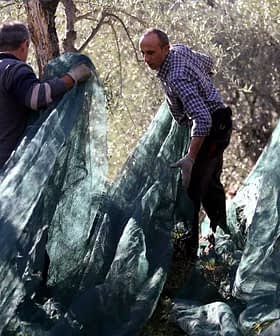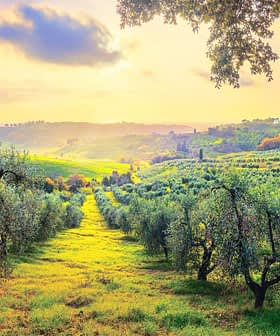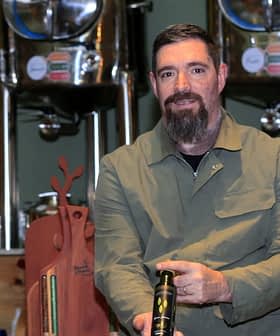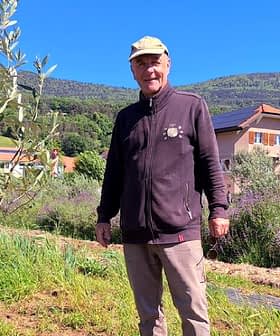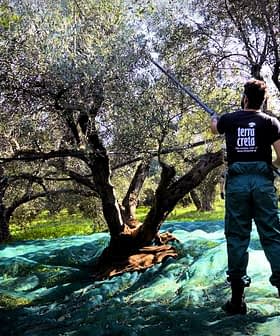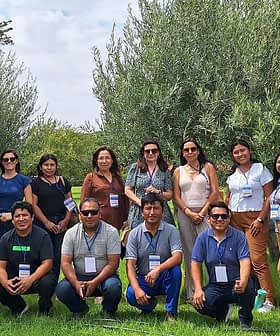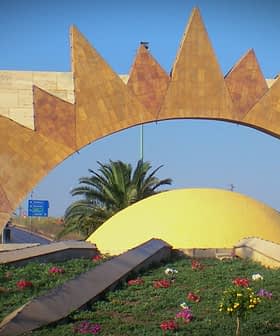Italian Producers Explain What It Takes to Succeed in a Tough Campaign
Harvesting at the right time, proper stewardship of the land, attention to details, teamwork, perseverance, and passion were all listed by award-winning Italian producers as the reasons for their success.
 Chickens enjoying the shade of olive trees at San Bartolomeo
Chickens enjoying the shade of olive trees at San BartolomeoSuccessful Italian olive producers attribute their success to passion, attention to detail, and perseverance, especially in the face of challenging weather conditions. They emphasize the importance of constant monitoring of the olive groves, quick harvesting, and teamwork, as well as taking care of the land and focusing on the smallest details in the production process to consistently produce high-quality olive oils.
“I have yet to meet someone at the top of their career, a ‘number one,’ who does their job without passion,” Giovanni Bonfiglio said, when asked about the key to success in such a difficult year for Italian olive growers.
“Passion leads you to pay attention to detail, to take care each phase of the production process and to work carefully and thoroughly,” he added. “That is exactly what quality producers do.”
Considering the difficulties we experienced over the last four campaigns, I can say that the secret (to success) is being constant and perseverant.
At Santa Catrini farm, near Siracusa, Nocellara Etnea and Biancolilla cultivars combine to create the award-winning Arita. Nocellara Messinese, Nocellara del Belice and Zaituna complete the composition of the olive grove managed by Bonfiglio.
“I can say that last year the climate has not gone hand in hand with the lifecycle of the olive trees, which have been under stress, with an impact on production,” the Sicilian producer noted, explaining that May was torrid and heavy rain fell in August.
See Also:Olive Oil News from Italy“Since then, it has become fundamental to constantly monitor the olive grove, in order to limit the effects of already unavoidable extreme weather conditions with prompt action,” Bonfiglio added. “All this requires a certain passion, thanks to which we have been able to achieve success at the 2019 NYIOOC World Olive Oil Competition.”
The period of time between harvesting and milling is another key factor to obtain a great product, according to Silvio Marsan of San Bartolomeo, who won a Best in Class Award.
“We have the possibility to immediately press the olives in our mill, which is adjacent to the olive grove,” he said. “Many olives were swollen due to the amount of water that they contained after abundant rains, and then they were more susceptible to damage during transportation. But we took all the fruit to the mill in an hour after the harvest, and this has certainly improved the quality of our extra virgin olive oil.”
“During the season, it was fundamental to intervene with all available means,” Marsan added. “Organic treatments can be very effective, then, for example, we used kaolin on our olive trees against the olive fruit fly.”
The olive groves of San Bartolomeo, which are mainly composed of Caninese with some Frantoio, Leccino, and Pendolino trees, are also home to free-range chickens. This type of integrated farming helps protect the land on which the olive trees are grown.
“[The chickens] enjoy the shade of the olive trees and contribute to their fertilization,” Marsan said.
Proper stewardship of the land was a common theme among successful producers last harvest season. Teamwork was too. In light of unusual weather during the olive harvesting season, it was important for producers to get the fruit off all the trees and to the mills as quickly as possible.
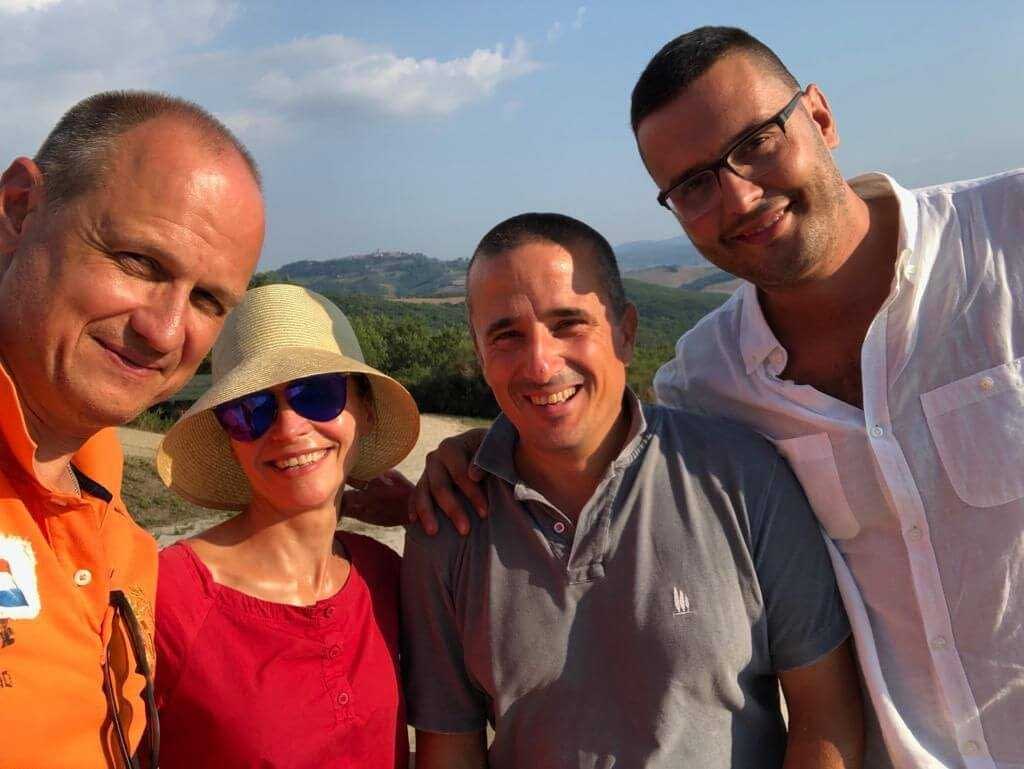
“Our key to success is our land,” said Alex Korop, co-owner with his wife, Ella, of Sant’Anastasio farm, which is managed in partnership with production director David Giacomelli.
“We are blessed with a unique land, and every olive that goes into our Elleivæ Biologico comes from our plot of land located on the hills of Pontassieve, near Florence,” Korop said. “Another strong point is our people, who passionately work on this land.”
Korop said that the family and Giacomelli have a plan to rehabilitate 2,300 olive trees and are considering the possibility of expansion in the same valley through long term leases or purchases of land.
“To obtain a good product it is also important to press the olives within a short time after being picked, and then we press every batch on the same day of the harvest,” he said, adding that they manage their groves completely organically.
“We recently bought a plot with trees that have not been treated properly for quite some time, and now we need to prune and recover them,” Korop added. “This process is expected to take three years, during which we will work with the usual commitment to quality and respect for the environment.”
Once again, the soil is identified as an essential element for the quality of the extra virgin olive oil made by Saverio Luzzi at Villa La Ripa.
“This land is very rich in sulfur compounds, and I believe that, in certain years especially, these promote the development of exceptional organoleptic characteristics in our products,” the Tuscan producer and neuropsychiatrist said.
Luzzi gave the name of Psyco to his blend of Leccino, Frantoio and Moraiolo. His olive trees surround an old Renaissance-era farmhouse, built around a tower from the year 1000 on the gentle hills of Arezzo, in the heart of Tuscany.
“Moreover, it is important to identify the right time for harvesting,” he added. “Now, I can say that an early harvest was crucial this year; then the olives were immediately brought to the mill, as we pressed them in no more than two hours, and this allowed us to obtain excellent results in such a difficult season.”
Each small gesture made throughout the production cycle has allowed us to make the difference between the ordinary and the extraordinary.
While proper stewardship of the land and harvesting at the right time are both crucial to producing an award-winning oil, doing so year in and year out requires perseverance.
“Considering the difficulties we experienced over the last four campaigns, I can say that the secret is being constant and perseverant,” Claudio De Luca said.
At Case d’Alto, he makes his monovarietal Coevo Ravece from olive groves located between Grottaminarda and Flumeri.
“A continuous monitoring of the plants, organically managed, allowed us to detect the first attack of the olive fruit fly,” he said, explaining that they acted immediately and saved the fruits thanks to the application of kaolin and both sticky and attractant traps, which release an intense smell in the fields. Thus, healthy olives were quickly brought to the mill.
“Despite the complex year that required more work and therefore higher costs, prices remained unchanged since last year,” De Luca added. “We want to meet our consumers’ needs, trying to offer them an excellent Ravece monovarietal every year.”
Along with teamwork, perseverance and maintaining the olive groves in a responsible way, Marco Prosseda of DueNoveSei said that paying attention to the smallest details and every day minutiae is key to consistently producing high quality olive oils.
“I think that the small things we do every day, day after day, are fundamental to obtain a successful product,” Prosseda said. “This becomes even more clear after last winter’s frost: what appeared to be a disaster, turned out to be an opportunity to improve, as we returned to the olive grove and realized that it was more necessary than ever to pay attention to every little detail and act with great care to heal the harmed olive trees, starting from a thorough ad-hoc pruning.”
In his olive groves, surrounded by the Sabina hills, Prosseda grows native cultivars such as Carboncella and Salviana, which were blended in the Gold award-winning Rosalena with Leccio del Corno and Itrana. Rosciola, Frantoio and Pendolino are also grown on the calcareous soil of Moricone, at the feet of the Lucretili Mountains regional natural park.
“We also made changes in marketing strategy, as we reduced our production lines from four to two, and this has been effective,” Prosseda said. “From pruning to pests monitoring, from harvesting the different varieties to the crushing in the shortest possible time, from storing the oil in tanks under nitrogen to blending it, while keeping it in optimal conditions.”
“Each small gesture made throughout the production cycle has allowed us to make the difference between the ordinary and the extraordinary,” he added.


